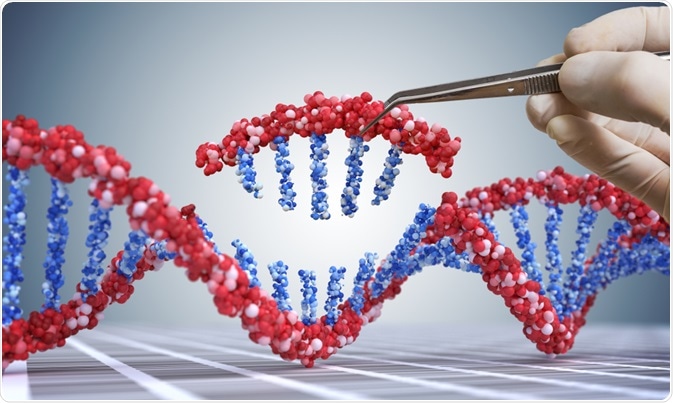What are genetic mutations?
Genetic mutations refer to a molecular change to the amino acids that make up DNA, responsible for coding for our genes.

Image Credit: vchal/Shutterstock.com
Mutations can, therefore, impact genetic expression. Mutations are alterations that diverge from what is normally found in humans, deviating from the DNA sequencing that keeps us healthy and functioning normally.
Mutations of the genetic code can occur in just a single DNA base pair or they can impact a considerable segment of the chromosome, affecting multiple genes.
Mutations are responsible for the diversity we see between organisms, but they are also at the root of some diseases. They have vastly different consequences depending on the segment of DNA they affect and how they alter it.
There are two classifications of gene mutations. The first category is hereditary mutations, these are alterations to the normal human DNA sequence that are passed down from parent to child and exist in almost every cell in the human body.
Because these mutations are passed through the DNA in the sperm or egg, which are known as germ cells, these mutations are sometimes referred to as germline mutations.
The second classification of gene mutations are acquired, or somatic, mutations. These are mutations that a person was not born with, and they can arise at any point in a person’s life.
The causes of acquired genetic mutations are numerous, they can be a result of environmental factors, such as exposure to the sun’s UV radiation, or that can happen during the process of DNA replication when DNA makes a copy of itself during cell division, but something goes wrong.
These acquired mutations are not passed on to the children.
How do genetic mutations impact health and development?
As discussed above, mutations interrupt the normal sequencing of DNA, leading to a number of alterations in how cells function, are structured, and/or are expressed.
Some of these mutations can be harmless, whereas others make a significant impact on the organism.
The human body relies on thousands of proteins, coded for by DNA, to precisely complete the jobs they were intended for. A mutation can stop this from happening by altering protein function or removing it entirely.
Mutations that impact proteins that are associated with vital roles in the body are those that can cause a medical condition or disease. The term genetic disorder refers to illnesses linked with mutations in one or more genes.
Single gene mutations have been attributed as the cause of alpha- and beta-thalassemias, cystic fibrosis, fragile X syndrome, hemochromatosis, Huntington's disease, Marfan syndrome, and sickle cell anemia (sickle cell disease).
Illnesses related to a combination of environmental factors and mutations in multiple genes include arthritis, Alzheimer’s disease, cancer, diabetes, heart disease, high blood pressure, and obesity.
The term mitochondrial genetic inheritance disorders refer to illnesses caused by a mutation or mutations in the non-nuclear DNA of mitochondria.
Each mitochondrion that exists within human cells has between five and ten circular pieces of DNA, and because egg cells but not sperm maintain their mitochondria during fertilization, mutations here can be passed to the children from the female parent.
Examples of mitochondrial genetic inheritance disorders include eye disease Leber's hereditary optic atrophy (LHON), myoclonic epilepsy with ragged red fibers (MERRF), and the rare form of dementia known as MELAS (mitochondrial encephalopathy, lactic acidosis, and stroke-like episodes.
Finally, there are chromosomal abnormalities such as Down’s syndrome, where a mutation in the carriers of DNA, the chromosomes, resulting in illness.
In Down’s syndrome, chromosome 21 is abnormal, where there are three copies of it instead of the usual two. Turner syndrome, Klinefelter syndrome, and Cri du chat syndrome are all examples of chromosomal abnormalities.
Perhaps at their most serious, genetic mutations can be fatal to the developing embryo, causing it to die before it is even born. This is because disruption to the normal processing of proteins can prevent key development changes from taking place.
The continued study of genetic mutations is allowing us to gain a deeper understanding of the numerous diseases linked with genetic mutations.
In particular, cancer research is focusing on the genetic changes that are linked with different forms of cancer to help scientists establish new forms of prevention, diagnosis, and treatment.
Sources:
- Cooper, D. (1993). Human Gene Mutations Affecting RNA Processing and Translation. Annals of Medicine, 25(1), pp.11-17. https://www.tandfonline.com/doi/abs/10.3109/07853899309147851
- Futreal, P., Coin, L., Marshall, M., Down, T., Hubbard, T., Wooster, R., Rahman, N. and Stratton, M. (2004). A census of human cancer genes. Nature Reviews Cancer, 4(3), pp.177-183. https://www.nature.com/articles/nrc1299
- Vogelstein, B., Papadopoulos, N., Velculescu, V., Zhou, S., Diaz, L. and Kinzler, K. (2013). Cancer Genome Landscapes. Science, 339(6127), pp.1546-1558. https://science.sciencemag.org/content/339/6127/1546/tab-article-info
Further Reading
Last Updated: Mar 18, 2020